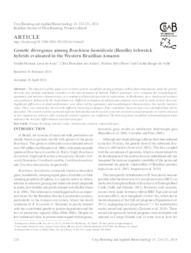Genetic divergence among Brachiara humidicola (Rendle) Schweick hybrids evaluated in the Western Brazilian Amazon.
Genetic divergence among Brachiara humidicola (Rendle) Schweick hybrids evaluated in the Western Brazilian Amazon.
Author(s): ASSIS, G. M. L. de; SANTOS, C. F. dos; FLORES, P. S.; VALLE, C. B. do
Summary: The objectives of this study were to detect genetic variability among genotypes of Brachiara humidicola, study the genetic diversity and identify redundant variables in the discrimination of hybrids. Fifteen genotypes were evaluated for morphological, agronomic and nutritive characteristics in a randomized block design with six replications, in Rio Branco, Acre. Analysis of variance was performed, followed by the Scott-Knott test. Different techniques of multivariate analysis were used to study genetic diversity. Significant differences in plant performance were observed for agronomic and morphological characteristics, but not for nutritive value. There was consistency between the different clustering techniques. Four redundant characteristics were identified hat can be discarded. The existence of divergent and superior hybrids that can be used in recurrent selection (sexual) programs or can be released as new (apomictic) cultivars after testing for animal response was confirmed. The lack of genetic variability in bromatological traits indicates the need for differentiated selection strategies.
Publication year: 2014
Types of publication: Journal article
Unit: Embrapa Acre
Keywords: Agronomic traits, Amazonia Occidental, Amazônia Ocidental, Analysis of variance, Análise de variância, Análise estatística, Análisis de multivarianza, Análisis de varianza, Análisis estadístico, Brachiaria humidicola, Capim Quicuio, Características Agronômicas, Fitomejoramiento, Forage grasses, Genetic variation, Gramínea forrageira, Melhoramento genético vegetal, Multivariate analysis, Método estatístico, Pastos forrajeros, Plant breeding, Statistical analysis, Teste de Scott-Knott, Variación genética, Variação genética, Western Amazon
Observation
Some of Embrapa's publications are published as ePub files. To read them, use or download one of the following free software options to your computer or mobile device. Android: Google Play Books; IOS: iBooks; Windows and Linux: Calibre.
Access other publications
Access the Agricultural Research Database (BDPA) to consult Embrapa's full library collection and records.
Visit Embrapa Bookstore to purchase books and other publications sold by Embrapa.

